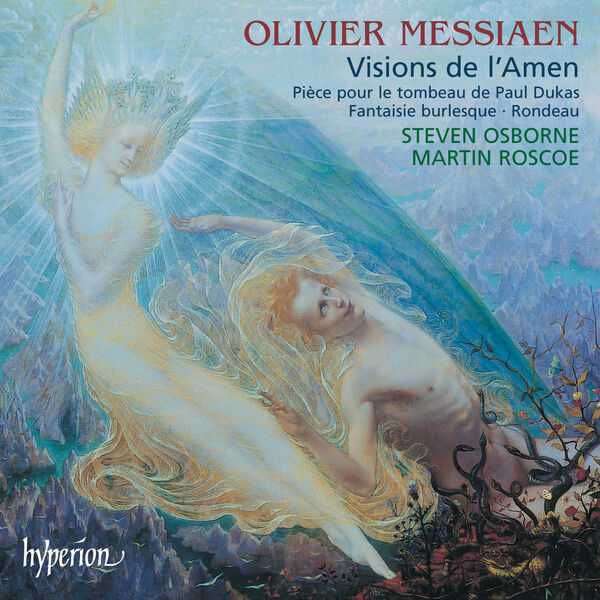
Composer: Olivier Eugène Prosper Charles Messiaen
Performer: Steven Osborne, Martin Roscoe
Format: FLAC (tracks)
Label: Hyperion
Catalogue: CDA67366
Release: 2004
Size: 174 MB
Recovery: +3%
Scan: yes
Visions de l’Amen for 2 pianos
01. I. Amen de la création
02. II. Amen des étoiles, de la planète à l’anneau
03. III. Amen de l’agonie de Jésus
04. IV. Amen du désir
05. V. Amen des anges, des saints, du chant des oiseaux
06. VI. Amen du jugement
07. VII. Amen de la consommation
08. Pièce pour le tombeau de Paul Dukas
09. Rondeau
10. Fantaisie burlesque
Steven Osborne has already made his name as an outstanding interpreter of Messiaen with his ecstatic recording of the Vingt Regards sur lEnfant Jesus (Hyperion, CDA67351/2), which was described by Gramophone as one of Hyperions finest piano recordingsquite an achievement in a catalogue of outstanding piano discs. Here he is joined by Martin Roscoe in an equally revelatory account of Messiaens other great religious piano cycle, this time for two pianos, the Visions de lAmen, composed a year before Vingt Regards in 1943. Their combination of emotional power, religious austerity, keyboard colour and dazzling pyrotechnics makes for an overwhelming and physically exhilarating experience. The listener is given an insight to what it must have been like to have heard the premiere of this work, played by Messiaen with his future wife, the immensly gifted 19-year-old Yvonne Loriod, to a strictly invited audience in Occupied Paris. Steven Osborne plays three solo pieces to complete the disc. The Rondeau was composed at the same time as Visions de lAmen, but is much less musically (although no less technically) ambitious. The other two pieces were composed in the 1930s, one in a more light-hearted vein, the other a contribution to a memorial volume for Paul Dukas, who died in 1935.
Steven Osborne continues his enthralling performances of Messiaen’s piano works, with Martin Roscoe joining him for the two-piano Visions de l’Amen. The two of them are flawlessly matched in their strength, control, and range of expression, even though for much of the work the two piano parts are largely independent. They move together from twinkling, distant starlight passages to powerful, brilliant solar flare-like passages. Osborne and Roscoe, although painting large pictures in the seven movements, demand that attention be paid to the details in the music. The “Amen du désir” has such a soft, quiet opening, it brings to mind the watercolors of Debussy’s music, and later in the same movement the percussion of Stravinsky’s Rite of Spring is also present. It’s an engrossing performance of an engrossing piece. Three small, solo pieces of Messiaen’s fill out the disc. The Pièce pour le tombeau de Paul Dukas is solemn, but not somber until the end, and Osborne gives its block chords a monumental weightiness, suggesting a double entendre in the title. The Rondeau is less complex and far-reaching than Messiaen’s larger works, but still has that visionary wonder and joy. The final Fantaisie burlesque has interesting episodes, but the humorous, jazzy refrain gets old fast, despite Osborne’s trying to keep it light.